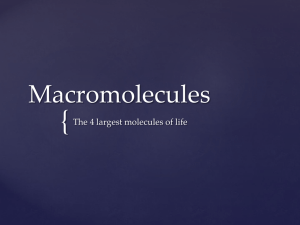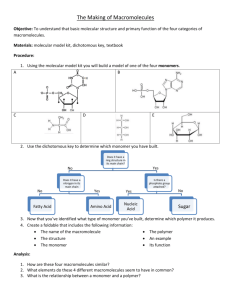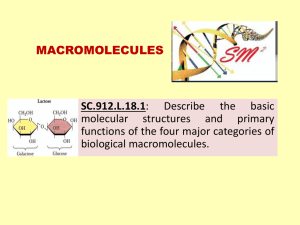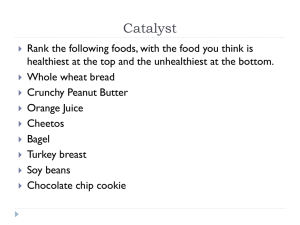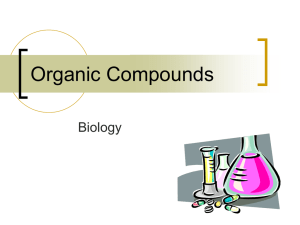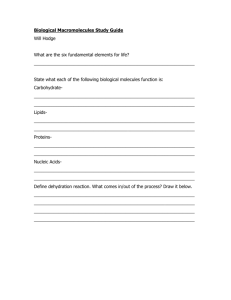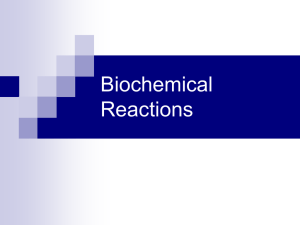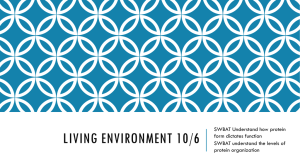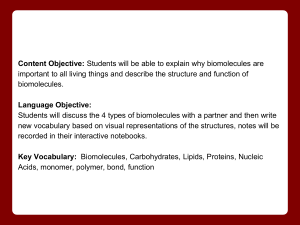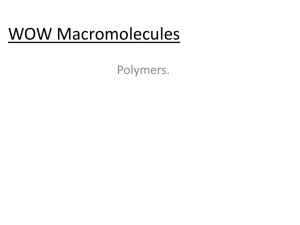Macromolecules
advertisement
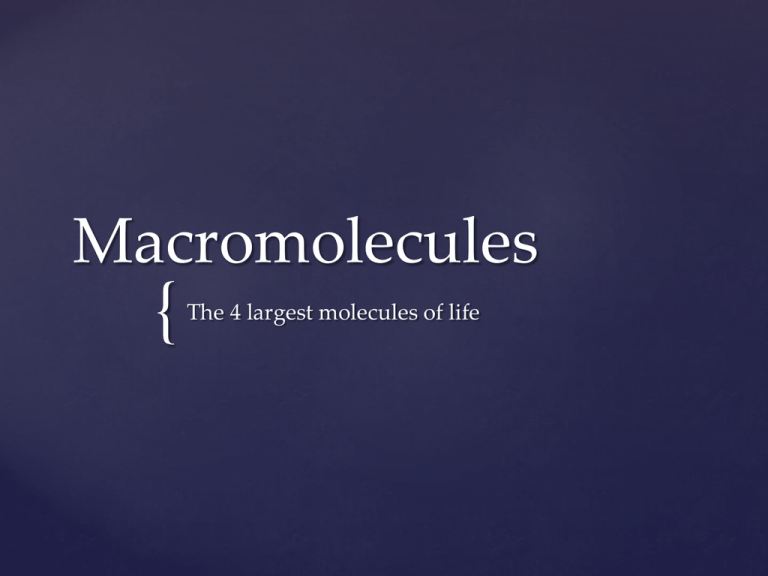
Macromolecules
{
The 4 largest molecules of life
What is life again?
The ability to biosynthesize the 4 major
macromolecules
i.e. you can create by yourself- the 4 major
molecules of life
Remember those elements
necessary for life?
The reason these are necessary for life is
because they are the basic ingredients for the
macromolecules:
CHNOPS
Carbon
Hydrogen
Nitrogen
Oxygen
Phosphorus
Sulfur
The 4 Macromolecules are:
PROTEINS
NUCLEIC ACIDS
CARBOHYDRATES
LIPIDS
Monomer
A building block for macromolecules
Its like one brick in a brick wall
Each brick is a link to a larger wall full of bricks
Important facts to take note of
on macromolecules
FUNCTION
Calories of energy
Chemical Structure
What is the name of its monomer?
What does the monomer look like?
What is the chemical structure of the
macromolecule
Examples
Carbohydrates
{
The energy and structure
macromolecules
Carb info
*Carbohydrate Energy: Carbs provide 4
calories of energy per gram
*Carbohydrate function: carbs are simple
sugars. Their job is in their simplest form to
provide energy, in their more complex form,
their function is structural (to help
*Carbohydrate Monomer: Monosaccharides
Image of Monosaccharide
(the monomer)
Image of Polysaccharide(The complete Carb)
Carbohydrate Examples:
In Plants
Main Energy Storage: Starch
Main Structural form: cellulose
In Animals
Main Energy Storage: Glycogen
Main Structural form: Chitin
PROTEINS
{
The Structural and enzymatic
macromolecules
Protein info
*Protein Energy: Carbs provide 4 calories of
energy per gram
*Protein function: structural, enzymatic,
(support, defense, and movement)
*Protein Monomer: Amino Acidsthere are only 20 amino acids that create
every protein in your body
Image of Amino Acid
(the monomer)
Image of Polypeptide
(The complete Protein)
*Protein Examples:
Enzymatic Proteins: ENZYMES- help lower the activation energy
to do chemical reactions, they usually all end in the suffix –ASE
some include: helicase, DNA polymerase,
Structural Proteins: hemoglobin is a structural protein in red
blood cells.
ENZYMES
Enzymes are special proteins used to reduce the
activation energy required for specific chemical
reactions within the body
Enzymes are :
Specific
Enzymes are:
temperature dependent- if it’s too hot or too cold they
breakdown
Salinity dependent- if it’s too salty they break down
pH dependent- if it’s too acidic or basic they break down
LIPIDS
{
Hormone, storage and insulation
macromolecules
Lipid info
*Lipid Energy: Carbs provide 9 calories of
energy per gram
*Lipid function: energy storage, insulation,
and membrane structure
*Lipid Monomer: in fats- fatty acid chains
Image of Fatty Acid Chain
(the monomer)
Image of each lipid type
*Lipid Examples:
There are three groups of lipids
FATS: saturated, unsaturated, trans fats
PHOSPHOLIPIDS: these are found in cell membranes
STEROIDS: like cholesterol, testosterone, estrogen,
NUCLEIC ACIDS
{
The information macromolecule
Nucleic Acid info
*Nucleic acid Energy: nucleic acids caloric
value is rarely documented or is of little
concern some sources say it provides 2
calories of energy per gram
*Nucleic Acid function: materials used for
storing the genetic information to create
proteins
* Nucleic Acid Monomer: Nucleotide
Image of Nucleotide
(the monomer):
Image of complete nucleic
acid:
* Nucleic Acid Examples:
DNA
RNA
